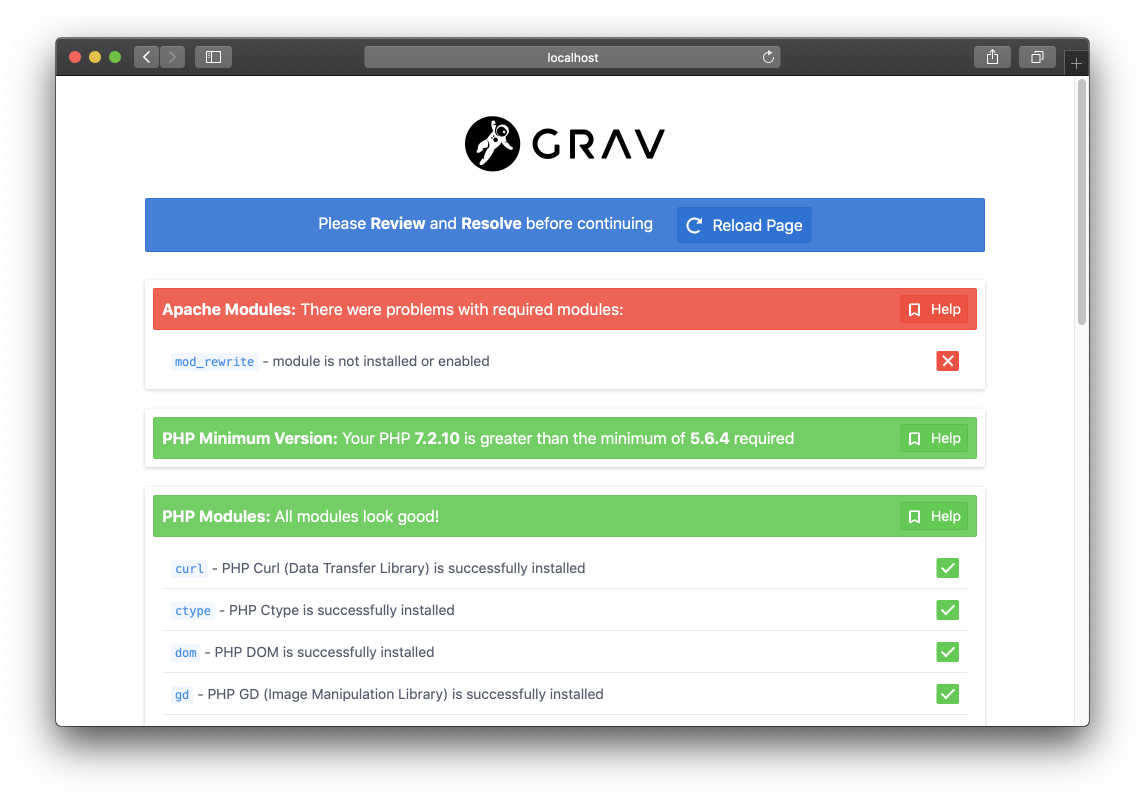README.md 5.9 KB
Grav Problems Plugin
Problems is a Grav Plugin and allows to detect issues.
This plugin is included in any package distributed that contains Grav. If you decide to clone Grav from GitHub, you will most likely want to install this.
Installation
Installing the Problems plugin can be done in one of two ways. Our GPM (Grav Package Manager) installation method enables you to quickly and easily install the plugin with a simple terminal command, while the manual method enables you to do so via a zip file.
GPM Installation (Preferred)
The simplest way to install this plugin is via the Grav Package Manager (GPM) through your system's Terminal (also called the command line). From the root of your Grav install type:
bin/gpm install problems
This will install the Problems plugin into your /user/plugins directory within Grav. Its files can be found under /your/site/grav/user/plugins/problems.
Manual Installation
To install this plugin, just download the zip version of this repository and unzip it under /your/site/grav/user/plugins. Then, rename the folder to problems. You can find these files either on GitHub or via GetGrav.org.
You should now have all the plugin files under
/your/site/grav/user/plugins/problems
NOTE: This plugin is a modular component for Grav which requires Grav, the Error and Problems plugins, and a theme to be installed in order to operate.
Usage
Problems runs in the background and most of the time you will not know it is there. Although as soon as an issue is caught, the plugin will let you know.
Problems checks for the following common issues:
| Check | Description |
|---|---|
| Apache | mod_rewrite is enabled if you are running an Apache server. |
| PHP Version | PHP version being run by the server meets or exceeds Grav's minimum requirements. |
| PHP Modules | PHP GD library is installed. |
| PHP Curl library is installed. | |
| PHP Ctype library is installed | |
| PHP Dom is library installed | |
| PHP OpenSSL library is installed | |
| PHP XML library is installed | |
| PHP Zip library is installed | |
| PHP Exif library is installed if Exif support is enabled | |
| PHP OpenSSL library is installed. | |
| PHP Mbstring library is installed. | |
| Essential Files | .htaccess file in Grav's root directory. |
Checks that all the files in the bin/ folder are exectuable. |
|
/cache folder's existence and verifies that it is writeable. |
|
/logs folder's existence and verifies that it is writeable. |
|
/images folder's existence and verifies that it is writeable. |
|
/assets folder's existence and verifies that it is writeable. |
|
/system folder's existence. |
|
/tmp folder's existence. |
|
/user/data folder's existence and verifies that it is writeable. |
|
/user/images folder's existence. |
|
/user/config folder's existence. |
|
Error plugin is installed in /user/plugins/error. |
|
/user/plugins folder's existence. |
|
/user/themes folder's existence. |
|
/vendor folder's existence. |
If an issue is discovered, you will be greeted with a page that lists these checks and whether or not your install passed or failed them. Green checks mean it passed, and a red x indicates that the there is something amiss with the item.
Problems uses the cache as refresh indicator. That means that if nothing has changed anywhere, the plugin will just skip its validation tests altogether.
If a change is caught and the cache is refreshed, the plugin will loop through its validation tests and making sure nothing is out of place.
Problems gets also triggered if any fatal exception is caught.
CLI Command
Problems 2.0 comes with a handy CLI command so you can run the checks at any time
bin/plugin problems check
You should see some output like this:
Extending Plugins
You can also extend the problems plugin via the onProblemsInitialized() event. The event includes an array of Problems. Simply create your own Problems class that extends the Grav\Plugin\Problems\Base\Problem class and add it to the array.

